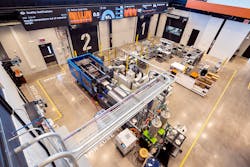By Bruce Geiselman
The Smart Factory @ Wichita, built with participation from more than 20 technology partners, showcases smart factory technologies including the Internet of Things, machine learning, big data, vision systems, cloud and edge applications, robots and autonomous mobile robots.
Deloitte held an in-person and virtual press conference June 7 to announce its opening on the campus of Wichita State University in Wichita, Kan.
The COVID-19 pandemic, a volatile supply chain, labor shortages and a fluctuating global economy paired with increasing demand for products are creating challenges for many manufacturers who find themselves relying on outdated legacy systems to power their operations, according to Deloitte officials.
“If the last couple years have proven one thing, it's that supply chains and manufacturing are essential to the prosperity of the nation and the world, and there is a long way to go for those supply chains and for manufacturing to embody the modernization, the integration of design and engineering in one smart digital way,” Dan Helfrich, chair and CEO of Deloitte Consulting LLP, said during the press conference. “The smart factory, we think, is going to be a huge part of lifting manufacturing accordingly.”
In addition to serving as a showcase of the latest Industry 4.0 technology for industry and students, the Smart Factory is an actual factory producing a new STEM education product. The Smart Factory @ Wichita partnered with Elenco Electronics and AWS to help produce and distribute the Smart Rover STEM kit, a Bluetooth-controlled, customized version of Elenco’s popular Snap Circuits vehicle-building kits.
These special edition kits, produced at the Wichita plant, exemplify the capabilities of the new end-to-end smart factory production line, according to Deloitte and Elenco. The kits from the Smart Factory are not sold, but are donated to schools to promote accessibility and STEM education.
Manufacturing of the kits began onsite in January and has been ramping up, with about 250 kits donated so far. Deloitte expects its donations in 2022 to be available to 1,000 middle school students in Detroit, Philadelphia and Wichita, and aims for its donations to impact 800,000 students in the United States over four years.
The Snap Rover includes a Raspberry Pi microcomputer and camera module to educate middle school students on product design, coding and engineering. The goal is to inspire a new generation to fill a growing talent gap in critical STEM-focused areas.
Housings containing the microcomputer and camera for the Smart Rover kit are injection molded on site from recycled PET, according to Deloitte. The rPET is collected from the local recycling stream. Additional parts are provided by Elenco.
The media tour of the smart factory included a visit to the shop floor, where the performance of manufacturing equipment is constantly being monitored. Monitors mounted above the factory floor and in a control room display performance data including overall equipment effectiveness, incoming orders, actual production rate vs. target, quality notifications and unplanned downtime, to name just some of the data displayed.
During the virtual tour PMM attended, guide Heather Denker pointed out that “there are almost 10,000 data points that we can pull from the factory floor and each individual cell to the line as a whole to our building elements, our HVAC, our lighting to our exterior elements as well.”
Visitors to the facility typically spend about four to five hours on a tour and will learn how data from interconnected systems can drive intelligent actions, according to Deloitte. They will also be involved in real-world demonstrations, hands-on workshops, and see practical applications demonstrating how their organizations can build a road map to accelerate growth.
A lounge, which is one stop on the tour, includes a six-axis robot barista that can furnish guests with drinks including coffee and hot chocolate and “has quite a personality as well,” said Denker, experience manager at The Smart Factory.
The 60,000-square-foot Smart Factory @ Wichita is powered by a renewable energy smart grid with onsite solar panels and wind trees, and energy-saving smart lighting is installed throughout the factory.
Wichita State University, which hosts The Smart Factory @ Wichita on its Innovation Campus, is using the factory in its curriculum as an applied learning experience to enrich its students’ education and help inspire the next generation of STEM manufacturing talent, according to a press release from Deloitte.
Deloitte expects the smart factory to draw more than 5,000 visitors, including leaders of well-known global companies, over the next year.
Deloitte provides audit, consulting, tax and advisory services to companies worldwide. Partners helping build The Smart Factory @ Wichita also include AWS, Dragos, Infor, SAP and Siemens.
PMM is focusing on smart factory technology in July; watch for more coverage on plasticsmachinerymanufacturing.com and in our print magazine.
The Smart Factory @ Wichita, Wichita, Kan., email at [email protected], www.thesmartfactory.io/
Bruce Geiselman, senior staff reporter
About the Author
Bruce Geiselman
Senior Staff Reporter Bruce Geiselman covers extrusion, blow molding, additive manufacturing, automation and end markets including automotive and packaging. He also writes features, including In Other Words and Problem Solved, for Plastics Machinery & Manufacturing, Plastics Recycling and The Journal of Blow Molding. He has extensive experience in daily and magazine journalism.
